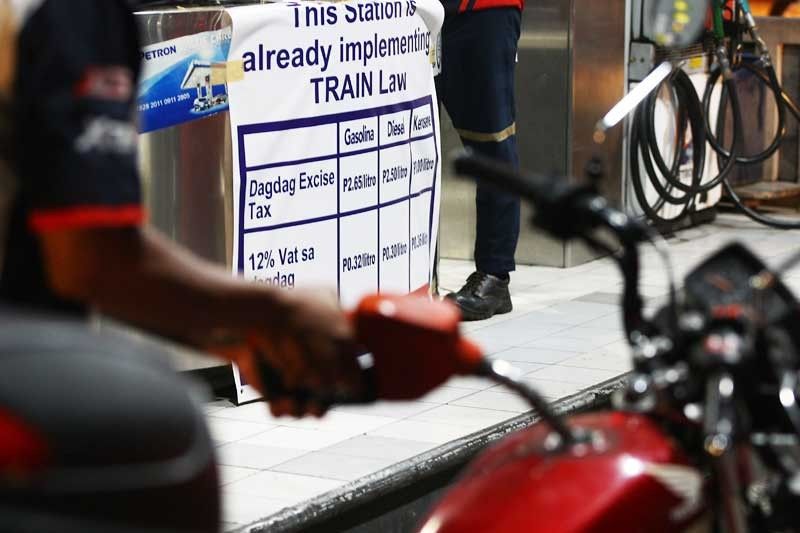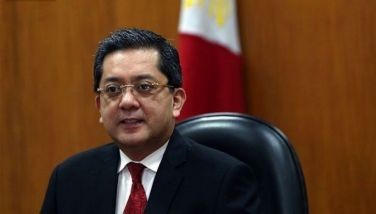More senators want excise tax on fuel suspended

MANILA, Philippines — As oil prices are seen to hit record highs, putting further pressure on inflation, more senators have joined calls for the suspension of a provision in the Tax Reform for Acceleration and Inclusion (TRAIN) law that raised the excise tax on fuel.
Sen. Grace Poe said she is inclined to recommend the suspension of the increase in excise tax on fuel to ease the plight of consumers who have been reeling from the continued increase in the prices of goods.
Poe, chairperson of the Senate committee on public services, conducted a public hearing in Iloilo City yesterday on the impact of the TRAIN.
“We will ask the Department of Finance and other government agencies to carefully study the suspension of excise taxes on fuel because of the continued increase in the price of petroleum products,” Poe said.
But the DOF said a provision in the TRAIN law or Republic Act 10963 already allows the suspension of the increase in excise tax if and when the Dubai crude oil price based on Mean of Platts Singapore reaches or exceeds $80 per barrel.
At the hearing, Poe and fellow senators Joseph Victor Ejercito and Nancy Binay were told that pump prices in the Panay region have already increased by 30 percent or at least P10 for diesel and gasoline since December last year.
Consequently, prices of rice, pork and fish have also gone up in the region at P5, P15, and P20 per kilogram respectively.
They were also told that farmers now spend an additional P2,600 a month while workers need to cough up P3,640 more for their basic needs due to spikes in prices.
Poe said the DOF should take into serious consideration the sentiments of consumers, particularly the poor.
Ejercito said the interests of consumers should take preeminence in the implementation of laws,
“I urge government to implement the TRAIN Law provision that provided for the suspension of fuel excise tax increase when the average Dubai crude oil price based on Mean of Platts Singapore for three months prior to the scheduled increase of the month reaches or exceeds $80 per barrel,” he said.
Ejercito noted that inflation was up by 4.5 percent in April and the price of crude oil is nearing $80 per barrel in the world market.
“While we understand the need of government to increase revenues, we need to prioritize the protection of the public who are bearing the brunt of these high prices which is negating the increase in take home pay brought about by lower income taxes,” Ejercito said.
“It is precisely the protection of the public, especially the poor that led the Senate to approve a version of the TRAIN Law that has lower excise taxes at P1.75 and a safeguard that suspends the excise taxes when inflation breaches four percent. This safeguard, however, was taken out in the bicameral conference committee version,” he added.
Under the TRAIN law, the excise tax on fuel products including the P2.50 per liter on diesel and bunker fuel as well as P7 per liter on gasoline took effect last Jan.1.
The excise tax on diesel and bunker fuel would go up to P4.50 next year and P6 in 2020, while that for gasoline would rise to P9 next year and to P10 in 2020.
The DOF stressed it is mandated by the TRAIN law to perform an annual review of the implementation of the excise tax on fuel and may recommend suspension.
Salary hike
Labor Secretary Silvestre Bello III, meanwhile, said in a television interview that he had directed the regional wage board directors to begin proceedings for a possible increase in wages.
Three labor organizations have joined the calls for wage increase citing the staggering increases in the cost of fuel and basic goods.
In separate statements, the Kilusang Mayo Uno (KMU) and the Partido ng Manggagawa (PM) said more Filipinos are getting mired in poverty because of the effects of TRAIN.
PM chair Renato Magtubo said a “supervening event from the sharp inflation impact of the TRAIN law is enough reason for the regional wage boards to conduct summary proceeding on wake hike.”
He noted that the wage boards need not wait for wage petitions to be filed before initiating discussions on adjusting salaries.
“Evidently, the effect of TRAIN law on inflation is fast and furious nationwide hence, the regional wage boards need not wait a year to lapse from their last issued wage orders before they can conduct public hearings on wage petitions,” he added.
KMU chairman Elmer Labog said an increase in inflation due to TRAIN has made wage hike “all the more necessary.”
“The state of wages even before the TRAIN implementation was already insufficient to cope with the prices of goods and services,” he said.
PM’s and KMU’s call for wage hike came after the Associated Labor Unions-Trade Union Congress of the Philippines (ALU-TUCP) sought adjustment in salaries last Thursday.
Finance Undersecretary Karl Kendrick Chua said the TRAIN law is not to blame for inflation’s fresh five-year high of 4.5 percent in April from 4.3 percent in March.
“Inflation rose mainly because of local and global factors. TRAIN accounted for only 0.4 percentage points of the 4.5 percent. In other words, if you could buy items for P100 last year, you need to spend P104.5 now for them and of that increase, only 40 centavos was due to TRAIN,” Chua said.
He pointed out it is convenient to blame the tax reform package and ask for its suspension.
“We have to match the proposed solutions to issues we want to address, and TRAIN is not the main reason for inflation,” he added.
The government has already transferred the National Food Authority (NFA) to the Department of Agriculture (DA) for better coordination, but rice prices could be up to P7 per kilo lower if imports are allowed freely but subject to tariff.
Right now, the government imposes a quota restriction on rice imports requiring importers to apply for a license, constricting supply in the process.
“Allowing the private sector to import rice but with tariffs will improve the supply response of the grain in the market and bring down rice prices. This will benefit the poor the most as rice accounts for 20 percent of their consumption,” Chua said. – With Sheila Crisostomo
- Latest
- Trending



























